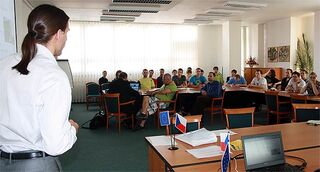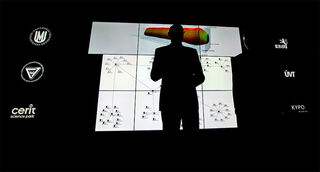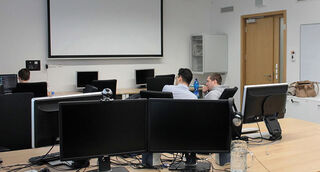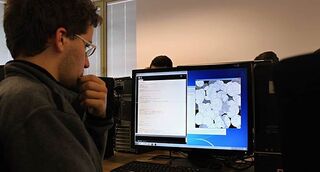Software Systems and Services Management
Degree programme objectives
The study program develops a unique competency profile of the student based on the intersection of knowledge from multiple areas relevant to the management of software systems and services development as well as cybersecurity management. A specific characteristic is the focus on strategic and operational management related to the targeting, design, implementation and operation of software systems and services within the context of organizations and different types with a possible focus on their secure operation or IT services. In addition to the development of basic theoretical and technological knowledge and practical development skills acquired in the Bachelor's degree, the content of the follow-up study is expanded to include other dimensions such as the theory and practice of team, project and process management, communication, soft-skills and knowledge essential for functioning in economic relations - the basics of marketing, law and others, which is especially (but not only) related to the specialization of service development. The study of cybersecurity takes into account aspects of the overlap of computing beyond fixed system perimeters (e.g. impacting critical infrastructures), thus allowing for a specific multidisciplinary technical overlap, societal and legal aspects in this area.
Study plans
Studies
- Objectives
The study program develops a unique competency profile of the student based on the intersection of knowledge from multiple areas relevant to the management of software systems and services development as well as cybersecurity management. A specific characteristic is the focus on strategic and operational management related to the targeting, design, implementation and operation of software systems and services within the context of organizations and different types with a possible focus on their secure operation or IT services. In addition to the development of basic theoretical and technological knowledge and practical development skills acquired in the Bachelor's degree, the content of the follow-up study is expanded to include other dimensions such as the theory and practice of team, project and process management, communication, soft-skills and knowledge essential for functioning in economic relations - the basics of marketing, law and others, which is especially (but not only) related to the specialization of service development. The study of cybersecurity takes into account aspects of the overlap of computing beyond fixed system perimeters (e.g. impacting critical infrastructures), thus allowing for a specific multidisciplinary technical overlap, societal and legal aspects in this area.
- Learning Outcomes
After successfully completing his/her studies the graduate is able to:
- Critically evaluate the benefits and implications of information technologies.
- Discuss the support that IT provides for operational and managerial activities throughout the software lifecycle, including related social and ergonomic aspects.
- Apply principles of selected project management techniques in practice.
- Communicate competently in a professional context.
- Actively participate in team-based work.
- Use advanced enterprise development tools in real development - specialization Software Systems Development Management.
- Make well-reasoned decisions regarding service system design and service innovation – Service Development Management specialization.
- Understand advanced concepts in the design, development, administration, and analysis of security systems – Cybersecurity Management specialization.
- Occupational Profiles of Graduates
Graduates find employment in companies and organizations of different focuses and sizes, but they also receive motivation and basic training for their own innovative business. A significant competitive advantage of the programme graduates is the ability to solve complex problems related to the management of the development of systems and services, for which they can use the skills acquired during their studies. Their potential predisposes them to managerial positions such as manager (CIO), project manager and risk manager. Graduates of the cyber security management specialisation will find employment mainly in companies and institutions that need specialists capable of cooperating with relevant coordinating institutions and ensuring the management of cyber security processes. These are positions such as Cybersecurity Manager and Chief Information Security Officer (CISO).
- Practical TrainingIn the Software Systems and Services Management study programme, students complete a compulsory internship of 10 weeks/400 hours within one semester. The student's activities during the internship must correspond to the so-called T-shaped focus, where in-depth knowledge and experience in computer science are required, as well as a broad overview and basic skills in other fields (economics, management, law, etc.). Information on internships can be found in the Course Catalogue, in the study materials of the course or on the website.
- Goals of Theses
For the master's thesis, the student is expected to primarily demonstrate the ability to complete a larger project, typically by analyzing and designing a solution to a practical problem in the field of digital services, based on the knowledge and skills acquired. This may include developing a useful software tool, implementing a service, designing and documenting the deployment of a non-trivial system or its extension. The student is expected to place their work in the relevant context of current knowledge and present it in the form of an academic paper.
The thesis can be written in Czech, Slovak, or English. The required structure includes the following sections: Copy of the Author's Declaration of School Work, Declaration of Authorship, Table of Contents, Main Text of the Thesis, and References. The minimum expected length of the thesis is 40 standard pages of original content (including illustrations).
- Access to Further Studies
After completion of the studies, it is possible to continue in doctoral degree programme (after satisfying the admission requirements).





